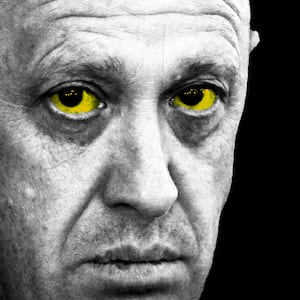Masked Wagner mercenaries have been paying tribute to their dead bosses at a makeshift shrine set up in the Russian city of Novosibirsk—and breaking down and sobbing uncontrollably.
Video of the memorial set up outside the Wagner Group’s recruitment center in the city shows members laying flowers on the ground in front of portraits of Yevgeny Prigozhin and Dmitry Utkin, the two top bosses believed to have been killed in a fiery plane crash Wednesday that may or may not have been an act of revenge by the Kremlin exactly two months after the group staged a violent uprising.
In the footage shot by the local outlet NGS News, one fighter in full military garb can be seen losing control at the memorial on Thursday morning, falling to his knees and audibly weeping while he hides his face behind a mask. Other mercenaries from the group have also reportedly broken down as they brought candles and flowers to pay tribute to Prigozhin and Utkin.
Similar memorials have been set up outside the group’s offices in Yekaterinburg and St. Petersburg, where both Wagner fighters and members of the public showed up throughout the night to pay tribute, according to the local outlet Fontanka.
The images of teary-eyed mercenaries overcome by emotion mark a surreal twist in the Wagner Group’s rise and fall since the start of Russia’s full-scale war against Ukraine last year. They went from a shadowy private army many in Russia had never heard of to a household name, affectionately called the “musicians” by supporters, even as they flaunted increasingly brutal tactics—circulating videos of executions by sledgehammer, the beheadings and dismemberment of Ukrainian soldiers, and ultimately killing several Russian service members in a violent mutiny to oust military leadership in June.
While the Kremlin has not yet commented on Prigozhin and Utkin’s reported deaths, several high-profile Wagner supporters blamed “traitors” within Russia for the “murders.”
“Let this be a lesson to all. You always have to go all the way,” wrote the neo-Nazi militia Rusich, apparently referring to Prigozhin’s decision to stand down from his armed uprising.
“The assassination of Prigozhin will have catastrophic consequences,” warned Wagner-aligned war correspondent Roman Saponkov, noting that those “who gave the order” have no idea what they’re in for.
Other Wagner supporters recalled that the pro-Russian separatists Moscow used to lead its first wave of the war against Ukraine in 2014 later died violent deaths: “Givi [Mikhail Tolstykh], [Alexander] Zakharchenko, and Motorola [Arseny Pavlov] didn’t stir up trouble. The main thing was to rally around [Putin]. By the way, where are they now?”







